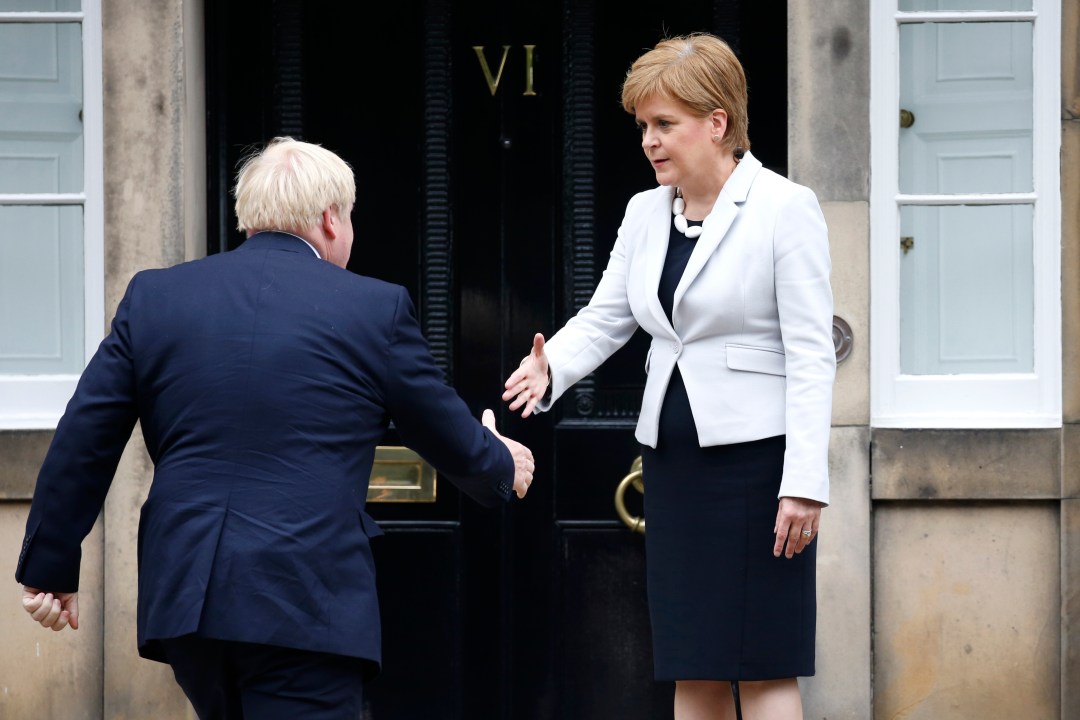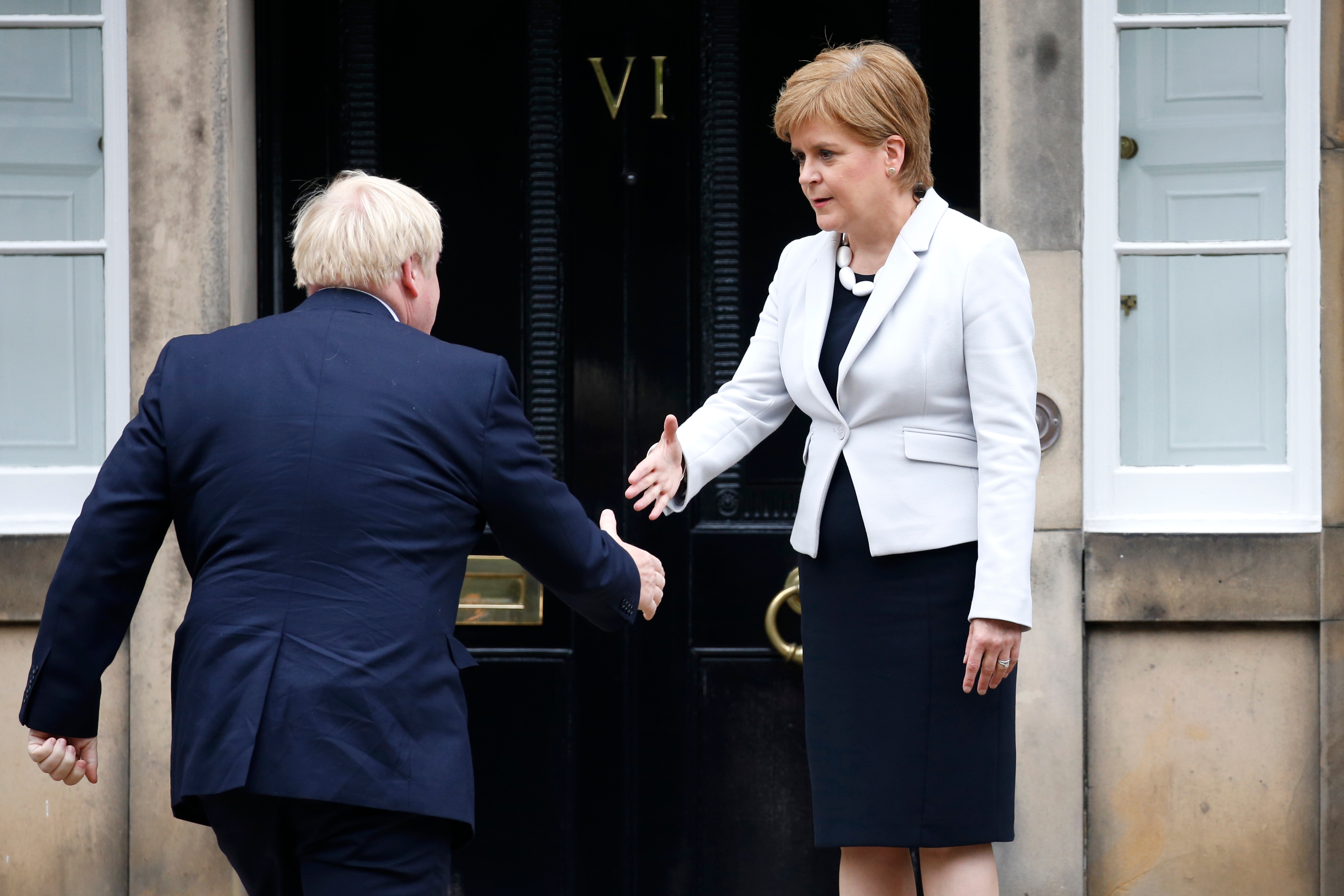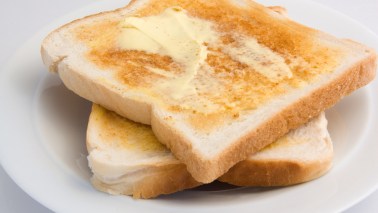One of the reasons the SNP has dominated Scottish politics for so long is that it is extremely adept at turning any crisis into a political crisis.
So it is with the recent figures revealing that the Scottish government has overseen a truly appalling rise in drugs deaths over the ten years it has been in office. Scotland now has the highest per capita rates in Europe, several times higher than those of England or Wales.
Yet if you ask Nicola Sturgeon, this is all somehow Westminster’s fault. The area is reserved and the Misuse of Drugs Act prevents Scotland introducing safe consumption rooms — so-called ‘shooting galleries’ — which she claims would make the difference.
Johnson was quite right, and certainly well within his rights, not to put the First Minister on his itinerary
This isn’t especially plausible. Whatever the merits or demerits of shooting galleries, other parts of the UK have managed to deliver much better results within the same legal framework. A decade of service cuts by the Scottish government seem much the more likely culprit.
Perhaps sensing the weakness of her case — and with no way of knowing that the Prime Minister would blitz the news cycle for her with a crass remark about Thatcher and the mines — the First Minister tried to confect a second constitutional row. When Boris Johnson refused to meet her during his visit to Scotland, she accused him of ‘snubbing’ her.
This is a fairly run-of-the-mill Nationalist complaint and ought not to be worth paying attention to. Unfortunately, however, it has been picked up by parts of Sturgeon’s chorus in London, some of whom seem prepared to take almost any line if it shows up the Prime Minister.
But Johnson was quite right, and certainly well within his rights, not to put the First Minister on his itinerary. In fact, it is important that he and other cabinet ministers do so. To do otherwise is to play into the SNP’s hands.
The Nationalists have long had a better grasp of the importance of institutional optics than their unionist opponents. Not for nothing did Alex Salmond immediately rebrand the Scottish executive as the ‘Scottish government’ when taking office in 2007, and replace its handsome coat of arms with a saltire. This is the same spirit that saw Scottish ministers make a determined effort to abolish the British Transport Police north of the border, despite the overwhelming opposition of its officers.
Across all of these policies, the common thread is an effort to ‘other’ the British state, its officers and institutions. And another part of this is trying to cast the Prime Minister and cabinet as foreign dignitaries whenever they visit Scotland. The First Minister’s position, echoed by clueless remainers, is that Johnson should mimic the protocols appropriate to a foreign visit, first of which is meeting his ‘counterpart’ as head of government.
But the First Minister is not his counterpart, and he is not a foreigner. He is the Prime Minister of the United Kingdom, visiting part of that country.
Far from granting Sturgeon the theatre of a meeting (and the opportunity for another stand-off over a referendum), we need to normalise members of the government making routine visits to Scotland in the course of their duties, building direct relationships with local authorities and civil society institutions while reminding Scottish voters that the British government is their government too. (Happily, with the UK Internal Market Act in place, there is scarcely a government department that cannot find itself some good to do on a UK-wide basis.)
Unionists also need to shape perceptions of the state and the devolution settlement. Too many of the devocrats are deeply determined to recast the UK as a sort of ramshackled confederation, and the battles they pick over titles are part and parcel of that effort. Note, for example, how Mark Drakeford’s misrepresentation of the UK in Welsh Labour’s manifesto have been followed by calls that his title be upgraded to Prime Minister, to cure voters of the (accurate and proper) impression that his position is ‘subordinate’ to that of the UK head of government.
In retrospect, granting the devolved executives control not only over policy but over the very architecture of the state was another hallmark bit of New Labour recklessness that unionists must repent at leisure. A future government would do well to consider reimposing some order and uniformity on the UK’s substate units, in line with normal practice in such systems overseas.
Until then, the very least today’s politicians can do is avoid compounding the problem by allowing the devocrats to meme them into acting like foreigners in their own country. Johnson has made many missteps in defence of the Union — but ‘snubbing’ Sturgeon was not one of them.







Comments